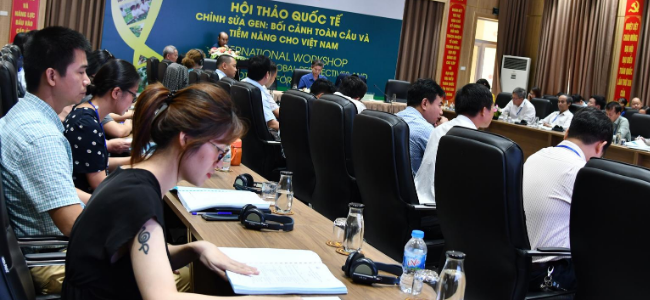The U.S. Grains Council (USGC) recently participated in the first scientific workshop on plant breeding innovation (PBI) and gene editing in Hanoi, Vietnam. The Vietnam Academy of Agricultural Sciences (VAAS) organized the workshop, which shared knowledge, experiences and global practices on these techniques for improving quality and productivity of Vietnamese agricultural products.
“Gene-editing technology and its potential for improving plant varieties, benefiting farmers and enhancing traits for commercial and consumer benefits has been a topic of growing interest around the world,” said Allison Nepveux, USGC manager of trade policy. “We, and our farmer members, commend VAAS and our partners in Vietnam for recognizing the benefits of advancements in plant breeding technologies.
“We are hopeful scientists will be able to utilize these new technologies to find solutions to some of our most pressing challenges in the global farming community. This workshop was an important first step in that direction.”
The workshop included scientists specializing in agriculture, biotechnology, genetics and plant breeding and representing research institutes, universities, regulatory bodies and local and foreign associations. Subject matter experts shared their experience with these techniques, including Professor Hiroshi Ezura, director of the Tsukuba Plant Innovation Research Center.
Dr. Ezura shared practical breeding implementation of Japanese tomato varieties created using gene-editing technology, to improve nutritional quality with high gamma amino butyric acid (GABA) content. GABA is a naturally occurring amino acid that acts as a neurotransmitter, which helps relax the body, ease stress, diminish fear and improve sleep. GABA became a popular ingredient in supplements in recent years but cannot be easily found in natural food sources. The creation of a new tomato variety from gene-editing technology with high GABA content was a major achievement, and the tomato variety continues to be widely developed in Japan.
While gene editing is a relatively new field in Vietnam, experiences like that of Dr. Ezura and the other speakers provide transparent perspectives on the development of new agricultural research techniques. The Council will continue collaborating with VAAS and other partners in Vietnam, providing technical support when possible and encouraging information exchange between private and public partners around the world.
“Vietnam is one of the fastest growing markets in the world,” Nepveux said. “Their leadership on gene editing could play a critical role in making this technology a reality for farmers.”
Learn more about the Council’s work on plant breeding innovations.
About The U.S. Grains Council
The U.S. Grains Council develops export markets for U.S. barley, corn, sorghum and related products including distiller’s dried grains with solubles (DDGS) and ethanol. With full-time presence in 28 locations, the Council operates programs in more than 50 countries and the European Union. The Council believes exports are vital to global economic development and to U.S. agriculture’s profitability. Detailed information about the Council and its programs is online at www.grains.org.

